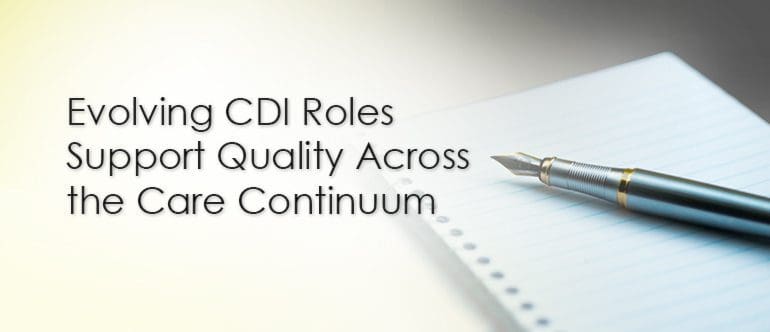Call us toll-free: 800-878-7828 — Monday - Friday — 8AM - 5PM EST

Article bySteven Robinson, MS, PA, RN, CDIP. This article was originally published on the Journal of AHIMA website on February 2, 2017 and is republished here with permission.
The role of a clinical documentation professional is increasingly critical to improved patient outcomes. Clinical documentation improvement (CDI) concurrent review efforts result in better accuracy of severity of illness and form the foundation for quality outcomes, fiduciary accuracy, and healthcare team communication during the inpatient stay.
For more than 20 years, CDI professionals have worked with providers to ensure quality inpatient documentation required for reporting, meeting regulatory mandates, and supporting patient care. Hospital senior leadership has recognized the value of the CDI professional role, thus validating the need for their expertise during a patient’s acute episode of care.
Now, CDI contributions are being further acknowledged as beneficial in specialty roles within their departments and in outpatient venues of care. As a result, adjunct CDI roles across the healthcare continuum continue to evolve.
This post explores six roles that have emerged with notable success and may be applicable to a strategic clinical documentation business plan.
Mentor for New Employees
The role of a highly skilled and experienced CDI professional is valuable to the process of introducing newly hired or transferring CDI professionals to their new position.
- Provide one-on-one training or “shadowing” opportunities
- Support development of orientation plan objectives and long-range goals
Internal and/or External Educator
Providing education to other departments and physicians reinforces the importance and value of accurate, complete, and timely documentation.
- Collaborate with auditor and/or analyze reconciliation reports to proactively identify trends and issues that inform ongoing education
- Facilitate opportunities to discuss a broad range of provider trends
- Proactively provide regulatory updates highlighting documentation-specific notifications, quality documentation requirements, etc.
Internal Auditor
The value of this role is easily measured by audit outcomes. Qualifications can vary depending on regulatory requirements and internal policies and procedures.
- Serve as internal advocate for CDI accuracy and/or as arbiter for final billing DRG assignments (MS or APR) and/or documentation supporting quality and bundled payment outcomes
- Acquire and apply variable credentials, usually a mix of advanced clinical/coding/quality backgrounds relevant to expectations
Leading Quality Outcomes—Adoption and Monitoring
As CDI professionals move toward incorporating the monitoring of AHRQ documentation inclusions and exclusion detail, knowledge of current and ever-changing regulations is critical—ensuring credible, day-to-day concurrent review. Housed within the quality department or the CDI department, this role requires accurate reporting of quality outcomes, subject to stringent penalty if not properly performed.
Internal Clinical Documentation Management Roles
Recognizing a person’s capability and desire for a management role is essential to staff and process growth. Look at performance, listen for positive and realistic dialogue, and identify traits such as leadership and perseverance. Setting reasonable, long-range expectations for the role will help determine a candidate’s readiness for the position. Consider the following when evaluating staff for a management position:
- Management of operations requires people skills before becoming a manager.
- A healthcare analyst may be of tremendous help to demonstrate outcomes.
- Setting budget expectations and providing internal coaching are necessary to manage a departmental profit and loss (P&L) statement.
- Management of daily duties requires hands-on experience along with oversight and support.
Leading Expansions of Inpatient Documentation Programs
As outpatient clinical documentation improvement (CDI) and other areas of expansion become a higher priority for healthcare organizations, opportunities for CDI professionals to lead such initiatives include:
Leading outpatient initiatives into other departments
- Outpatient clinics—specialty clinics, physician practices, and more
- In-house OP venues—such as emergency department, radiology, infusion therapy, lab
Leading expansion of CDI efforts into existing departments
- Nutritional Services—How can a nutritionist be an adjunct to the depiction of a patient’s severity of illness?
- Care Management—How can care managers be better served if they have full access to the concurrent documentation MS-DRG/APR-DRG and GMLOS?
- Quality Management—Are quality/regulatory mandates supported by documentation accuracy? How can the transparency of documentation better serve quality reporting?
- Coding/HIM—Would there be less need for code/DRG mismatch reviews if concurrent coding/CDI transparency, communication, and process were available?
- Population Health—Would OP clinics and physician offices be better served, more accurately act on and then report patient chronicity if inpatient records were more easily accessible in OP venues of care?
Regardless of their chosen role, a knowledgeable clinical documentation professional can help make a difference in achieving the goals of healthcare initiatives that are aimed at improving the quality and effectiveness of healthcare delivery.
